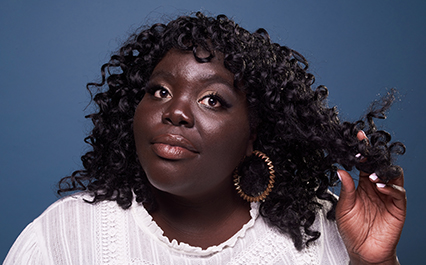Page Content

PHOTO BY STEFAN LEGACY
Hair. The relationship I have with mine is ... complicated. Beginning in elementary school, I would look at my friends, whose hair was different shades of blonde, brunette and red; wavy or straight; streaked or crimped. I felt pangs of jealousy.
I had ... box braids (a protective style often done by Black women without heat). I didn’t want box braids. I wanted to be Beyoncé (honestly, I still do). I hated having to sit for so long for the neat rows and plaits to be completed. It hurt. Why didn’t my hair lay flat? Out of braids, my hair was an afro, which I despised. Why did I need an afro pick? Why couldn’t I use a round brush or straight comb?
How is Black hair different?
The makeup of Black hair is incredibly different from that of the hair of other cultures. Also referred to as kinky or Afro-textured, each strand of this hair type grows in a helix shape. For this reason, it is dense. Despite its density, it varies in oils, due to the tightness of the curls. For Black people, knowing the specific characteristics of their hair helps them determine how to maintain, style and care for it.
Respect
Being able to appreciate another person’s genetic makeup is fundamental to human decency and understanding others, but asking me to touch my hair is not a compliment. Quite the contrary; it makes me feel othered. It makes me feel different. It puts me in a separate category from my friends and colleagues.
My hair texture should not be a concern. I often wonder, when someone asks to touch my hair, if that question is posed to a woman of any other colour. It hurts to think that my validity is centered around whether someone can touch my hair. My validity should be based on my work ethic, my spirit and the way I treat others, not follicles that grow out of my head.
Identity
In precolonial societies, hair signified where people lived, the tribe that their family was from and the wealth that their family obtained. In recent times, hair has become a part of Black people’s personal signature. Black men take the time to style with different cuts and waves, while women take the time to curl, moisturize, decorate and colour their hair. It has become a statement piece.
One thing I want to note: people are not defined by their hair. I have spoken to Black women who have had to make myriad changes to their hair to be accepted by their peers, in-laws and colleagues. Teachers in my network have completely chopped their hair, taken on uncomfortable styles or turned to wigs. In order to fit in, identity is thrown aside and it becomes lost.
Discrimination against Black hair
Over the last few centuries, the social roles of Black hair have shifted. Hair is often looked at through the Eurocentric lens that beauty and worth are determined by how straight or light hair is. The idea that Black hair is not easy to maintain, “savage” and “ghetto” are stereotypes from slavery, suggesting that Black people and Black hair are inferior. Unfortunately, many of those stereotypes and feelings have trickled into the present day.
"Black women's beauty was depicted as a negative, and we can see that from the time of enslavement in North America forward," said Tracy Owens Patton, a professor of communication and African-American diaspora studies at the University of Wyoming, who has spent time tracing how Eurocentric beauty standards have shaped the psychology of Black women today. As a result, Black women have spent much time trying out Eurocentric styles and maintenance techniques that simply do not work on Afro-textured hair. This causes damage, breakage and shrinkage of the curl patterns that are characteristic of Black hair.
Self love
Presently, I am a 31-year-old Black woman. I spent nearly 20 of those 31 years fighting with my hair and stressing over its struggles. In hating my hair, I failed to see its beauty. Gradually, by surrounding myself with people who have shown me how to care for Black hair, following social media accounts that promote it, and learning more about my hair and its history, I have come to love the texture of my hair. I love the inventive styles created to protect it. I love the bounce it has and the shape it takes. It’s soft and textured. I love the depth in its colour and shine. As I begin to embrace my hair, I recognize the privilege that I now have.
The students in my classroom, from our first day of instruction, learn about both representation and identity. It is my firm belief that students should know where they come from and have a sense of pride and belonging in their cultural community. One of the joys of my job is that I am able to teach and influence my students to love themselves exactly as they are. The students in my class know that they will always be celebrated. Their hair makes no difference to me in the grand scheme of who they are as a student. My hope is that people in all industries will think this way, eventually.
Black hair is not an enemy; it has so much depth and beauty. My hair is a reflection of my ancestry, my soul and my melanin.
